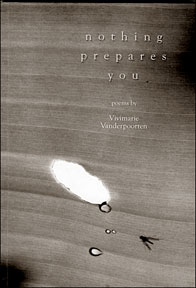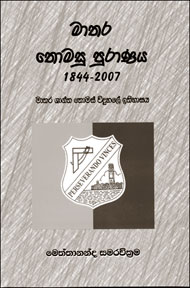|

Gaze of everyday eyes
Reviewed by Malinda Seneviratne
|

Title: Nothing Prepares You
Author: Vivimarie Vanderpoorten,
Zeus Paperbacks, 2007.
|
There are two kinds of writers. Some describe what we all see in
exquisite ways. They give the ‘everyday’ a beauty that we never really
noticed before. Then there are those who write that which we didn’t
notice was there before our eyes.
We are thus mesmerized by language use or we acquire new eyes. We
become more appreciative of the world around us. We become more
empowered. And somewhere in the play of metaphor and meaning we learn
something about ourselves.
I am not a frequent visitor to bookstores for quite unforgivable
reasons, but when I do go, I look for poetry, especially poetry by Sri
Lankan authors.
A lot of people write these days and I am aware that there are many
creative writing groups encouraging young people to write, and I am
aware that many people do have the money to publish their work.
An encouraging sign, I tell myself especially since there is no doubt
that there is abundant creativity and energy evident in these many
collections.
There is of course a flip side. It is easy, relatively speaking, to
be ‘creative’. To craft, that is a different matter. T. S. Eliot and
Ezra Pound come to mind. Eliot dedicated ‘The Wasteland’ to Pound, ‘the
finer craftsman’.
There are brilliant pieces, I have seen. Tend to be raw, though.
Also, in any given volume, one would find at best two or three good
poems. That’s it. You find great lines in fairly pedestrian poems. So,
with respect to talent, yes, we are not lacking. Craftsmanship is a
different story.
This is why Vivimarie Vanderpoorten’s ‘Nothing Prepares You’,
surprises one, I believe. She’s got the insights, the words, and the
craftsmanship. She is both an excellent ‘describer’ of things we
experience and encounter all the time and is a revealer of things we
just don’t have the eyes to capture.
Vivimarie makes us say, ‘that’s so true’. She articulates that which
we cannot put into words. Makes us feel nice that someone else also felt
the same thing, saw the same thing. She’s an affirming writer who makes
us feel good about ourselves, or, in the flip side of it, make us say
‘it’s alright then’. She has the words and the courage. Poets are
supposed to have both.
Has sorrow nothing to lose,
Does it therefore sing?
We are content in experiencing joy. We rarely write joy. Sorrow we
splash all over are preferred canvass. We all know this. We don’t say
it. And even if we did, we would arrange the words in awkward manner.
She says it well.
‘Grief has no words,’ she claims, without shame, the opposite. Such a
cliche, right? Wrong. It is all about context. ‘They Said’ is about
reactions to a sobering fact, death. ‘They’ will have things to say.
Why? They do not grieve. ‘We’ on the other hand, are robbed of word.
Vivimarie writes a personal moment but the sense one gets is that it is
not so much the ‘personal experience’ that inspires the poem than the
fact that a good observer was endowed with the word.
Who has not been intrigued by the art of reading palms? Who has never
stretched out his/her palm for a palmist to read? Who would see the
lines on the palm as roads?
These lines, they read
like roads in
a city without maps.
The metaphor was always there. In the palm of our hands. We never saw
it, did we? She did. And she transcribed it with great economy and still
managed to work in several layers of meaning. And so, when we open our
hands now, we can extrapolate in many directions, with or without
roadmaps. I find it empowering.
There are in this collection, the articulations so typical of love,
lovers and the forsaken. The sentiments and even the lines are
predictable. At least for those who have loved, been loved and left.
Still, Vivimarie manages to throw in that deft twist that is not simply
word-play but expression of a deeper sensitivity and evidence of
exceptional literary skill.
Take ‘For DS’. The narrator’s name has obviously been replaced by
another’s in the heart of the addressee. “When I’m gone, you’ll find
someone younger, smarter, more beautiful, etc. etc. etc....,” she
writes. And adds, within brackets “I’m sure you will”. She’s pouting.
‘What’s the point?’ I found myself asking.
But maybe
just maybe
she’ll not write
poetry
for you.
Quite pedestrian, if you ask me. Except that Vivimarie come up with
this simple but brilliant touch to end it. It is bracketed thus: (“I
hope she will”). One hears and feels in this the softness of voice and
heart of the poet, respectively.
Vivimarie gives colour to the black-and-white of our “everydays”. She
narrates in anecdotal fashion the things we’ve all done and seen.
Requires great observation skills, a penchant for telling a story and
yes, craftsmanship. In ‘You’re welcome’ for instance she uses a simple
matter of gifting warm clothes to an Oxfam Shop to express the quiet
thrill of going home and, inter alia, she makes a deft comment on
stereotyping (she says a lot in the little she says):
Crinkly doll’s-eyes
take in....
my black eyes-hair-skin
Un
certaitly
skims
the surface of those blue pools
for a millionth of a second.
An eyebrow is raised a zillionth of an inch.
She’s noticed a lot.
Clearly a heart person, the author writes much on heart-matters.
Intense passion, melancholy, longing and the simple everyday thoughts
that crowd those in love find expression in these pages. Love poetry, in
general, is appreciated by recipients. Outsiders tend to get nauseated.
One loves to exaggerate love, but exaggeration by others in love with
others, make one cringe. But check out “Haiku: Cyber-love”:
Babe, I’m online and
Happiness is virtual
Log in to my heart.
Heart she has, for other kinds of love. For a father, for example.
Grief is a word that is tagged with ‘outpouring’. In her case, she makes
it trickle down to dimensions that are manageable but nevertheless
telling. Tears are easy signifiers. We notice them. They say ‘grief’,
‘grieving’. They say nothing of the why and how, the details of the
source. Vivimarie takes us on a tour of this other map, the
beneath-the-tears place of grief.
It is not all dark and grey, though. No, her poetry is infused with
humour, with irony. Like in ‘Explosion’, where she brings a ton of
bricks on an insurers pay-off line by throwing it into the debris of a
bomb explosion:
Out of the broken window
of a damaged car
dead driver
the radio blared, unscathed
on a commercial break
a man’s pleasant voice
announced
that big or small, insurance
protects them all.
Or this, in “Haiku: Elections”:
A man pees against
the wall, smiling lies can wait:
Nature’s call is strong.
She can even laugh at love (“Celebrating Love”):
Quick, find it
Before it vanishes
Before it turns into a pumpkin
At Midnight
On Valentine’s Day.
It’s all deeply personal but a ‘personal’ that one can relate to. It
is social comment inspired by the gaze of everyday eyes. Eminently
readable.
Rememberable. To coin a term.
A dancer’s passage to the world of books
By R. S. Karunaratne
Very few writers can dance and only a few dancers can write. So, if
you come across a writer who can dance, that is news. Similarly, if you
meet a dancer who can write, that person deserves attention.
I met Subashini Pathmanathan as a dancer about two decades ago. The
shy and petite girl who had her primary education at the CMS Girls’
College. Jaffna had an aptitude for dance from her young age.
Her parents paved the way for her to excel in dance by sending her to
the Government College for Women in Chandigarh, India where she
graduated. Then she was admitted to the University of Punjab, India for
her postgraduate studies.
Unlike many other dancers, she was trained in Bharatha Natyam by the
late Padmashri Vazhuvoor Ramiahpillai for seven years. The revered
teacher conferred the title of “Natya Kala Shikamani” on her.
Meanwhile, she also completed her Diploma course in Bharatha Natyam
at the Vazhuvoorar Classical Bharatha Natyam Art Centre in Chennai,
India. Later, she completed another Diploma course in Bharatha Natyam
conducted by Bharathi Dasan University, Thiruchirapalli, India.
At present, she is reading for her Master’s degree in Fine arts in
Bharatha Natyam. With all her academic qualifications, she launched her
career as a Bharatha Natya teacher 35 years ago.
During this long period she has presented numerous Bharatha Natya
dance recitals in Sri Lanka and abroad.
Subashini established her own dance academy- Vimalothaya Classcial
Bharatha Natya Kendra- in Colombo in 1991. Soon the academy became a
hive of activities for training of students and presenting them for
degree programmes in Bharatha Natyam. Now it is affiliated to Kalai
Kaviri College of Fine Arts in Thiruchirapalli and Bharatha Dasan
University, India.
The students of the centre have performed in numerous classical dance
recitals, dance dramas and epics.
When the Indian Cultural Centre (ICC) was opened in Colombo in 1998,
Subashini was picked to conduct the Bharatha Natyam courses at the ICC.
While conducting lectures, lecture demonstrations, workshops and
seminars, Subashini’s services were sought by the Hindu Cultural
Minister, Hindu Cultural Department and the Art Council of Sri Lanka.
Despite her busy schedule, Subashini also perfected the art of writing
by producing various articles on many aspects of dance both in English
and Tamil. She won the Esmond Wickremesinghe Award for Journalism for
her creative writing on dance.
Upto now, Subashini has written four books on dance in Tamil. The
books, “Natyakalai” (1993), “Arunkalai adal Kalai” (1998), “Nunkalai”
Nadanakalai” (1999) and “Paynkalai Bharatha Kalai” (2006) were well
received.
Subashini’s latest book “Bharatha Natyam- a Basic Study” is written
in English for non-Tamil speaking students and readers. It was launched
at the Indian Cultural Centre, Colombo 4 on April 11 at 6 p.m. The
printing of the book has been sponsored by the India- Sri Lanka
Foundation.
A journey through time
Memoirs of Matara St. Thomas’ School:
“Education follows a man everywhere” so says a Chinese proverb and to
a great degree it will explain the love and appreciation a student will
have for his alma mater.
 Yet, not all students are processed with the ability to write but
Mettananda Samarawickrema has excellently put together a comprehensive
selection of his schools history and of Matara itself in his “Memoirs of
Matara St. Thomas’ School” and invites the reader into a journey through
time. Yet, not all students are processed with the ability to write but
Mettananda Samarawickrema has excellently put together a comprehensive
selection of his schools history and of Matara itself in his “Memoirs of
Matara St. Thomas’ School” and invites the reader into a journey through
time.
Going back in time to British rule when the Christian Missionary
Movement inaugurated St. Thomas’ School on 10th March 1844 with not more
than 11 students, today the school stands out with a proud history of
over one hundred and sixty five years and over 3300 students. Matara St.
Thomas’ School has produced some of the most prominent men in Sri Lanka:
late Maddihe Pannaseeha thera, R. S. S. Gunawardena, late Badiud deen
Mohamed, Bishop J. J. Gnanapragasam and Pandit Munidasa Cumaratunga to
name a few.
The task of compiling the book took over 15 years of thorough
research, meticulous reading and interviews with many past and present
pupils and academia. The photos depicted are quintessential and leads
the reader to reminisce.
We can then fathom the passion with which the book has been written
and embrace the rich history of Matara through colonial times; through
the temples, Churches, mosques, the Matara town, the fort and foreign
invasion to the present era.
He has dedicated the book to 3 members of the Colombo branch of St.
Thomas’ College, Matara namely Dudley Dewaraja, Alfred Edirisinghe and
Robert Prasad Punchihewa. The foreword is by Prof. Jagath Wickremasinghe
and everyone is definitely encouraged to read “Memoirs of Matara St.
Thomas’” from start to finish.
- Shenali Waduge
In a lighter vein:
Pre-historic drama
By Padma Edirisinghe
I live in an area roughly corresponding to the backyard of the
Parliament complex. Bragging? Yes, I have to. Born in a village 25 miles
off the capital where on fullmoon lights fox - bands emitting their
weird music across the fields, are heard the present location can be
considered an elevated change.
Since a few weeks back I have made it a practice to come on to the
balcony and feast my eyes on the scene below. I am just glad that I am
not there, in the chaotic pandemonium going on, below.
A new phenomenon, I am not sure whether they are emerging from the
pre-historic period, but they really approximate to that vision as they
lazily get on to the main road, appearing from the devata (path) before
my house. One, two, three.... I count.
They add up to about fourteen. Fierce looking, massive dimensions,
colour, ash, taut skins, horns just ready to mangle any aggressive
oncomer. They are let loose at about 7.00 a.m. By some farmer working in
the fields by the Diyawanna when the traffic in this spot is at its
peak.
Readers who have bothered to come up so far would now be cursing me
and arguing as to why the merry hell I did not send this piece to the
letter to the editor column for the apparent objective seems to impose a
ban on the buffalos or the Meeharakkos as we, the raw native Sinhalas
call them. No. I plead intensely for a “No ban” but an eulogy.
That farmer should be further presented with one of those doctorates
going around despite the “ambude” or span cloth covering his nudity.
Many rationalize that many of the doctors, the academic ones, I mean,
do not deserve them especially when they think it warrants them for
bellicose behaviour culminating in physical attacks and insulting
non-academics or those who due to many a circumstantial factor could not
get letters in the alphabet to trail their names.
That farmer is certainly intelligent enough to teach society a few
good lessons. For one thing I notice a division or balance of power. It
is not only the State empowered officers who can now stop vehicles.
These Meeharakos too stop them. So the egoism of those uniformed
officers gets mitigated.
Then they make a fifth line of traffic and take care to disrupt all
the other four making pell-mell of the scenario. Here they seem to
illustrate that nature (personified by them) can over-rule man made
laws. Everybody recedes respecting their bull-headedness or just plain
stupidity. I have not heard any one cursing them.
But I watch faces getting wreathed in smiles or breaking into
laughter, easing the morning tension building up in 21st century humans
on week-day mornings when all hell seems to break loose in the major
cities of the island and their suburbs.
I wish I had the power to make this Madiwela farmer’s practice
compulsory throughout these frenzy-affected areas in order that the
plethora of mental afflictions get lessened without any cost.
And it breeds many other virtues too. One day I descended to collect
my newspaper which the man responsible had strewn outside my gate in his
mad hurry over nothing in particular but just wished to simply
contribute to the chaos around.
A van had been just stopped by my four-footed friends who were
walking ahead in a very slow gait, with not a panam’s care for 21st
Century civilization and all its symbols. Fourteen in all. It would take
some time for the van to get going. So the passengers had struck up a
conversation.
“Machang. Seeing these fellows after a long time.”
Answers machang. “I was just thinking the same. In fact I remembered
the fields in my village and my appochchi running after them.”
“First time I heard you mention your appochchi”
“Why? Did you think I am an Opapathikaya born without my parents?”.
And he goes on to give a vivid account of his family, hearth and home
that he says he suddenly got a yearning to visit.
So those animals who according to those learned in the particular
field (not the paddy field) have come down to modern times with very
little altered from pre-historic days have managed to engender in the
minds of humans gradually turning into heartless robots feelings as
nostalgia for the village and the forgotten fields cum a desire to visit
the dear forgotten folk back home. I collect the strewn newspaper and
get back. The van moves on after the pack of animals.
A lovely vision metamorphoses before me, a vision I had not
envisioned for a long time. A village, a house by the fields, oxen
trailed by our dear farmers, the green gold paddy seeds glistening on
the stalks, a hundred white cranes flying over groves of dan, himbuttu
and mora shimmering in their purple and yellow skins. And then this
endearing human drama between a farmer and his wife. “Can I believe my
eyes. Ane Deiyane! (Oh! Dear gods!) Come. Come.
Lamainge thaaththe (Father of my children!) Look who is coming! Our
Podi Putha!”
Who has been responsible for the transformation of the man who is
forever digging his pot of gold in the capital and living most of his
time in vehicles madly rushing about his old parents forgotten?
It is the magical buffaloes of Madiwela where on an island of the
Diyawanna once thronged with coconut trees that were tapped for toddy
(according to tales of the area) has come up the mighty Parlimentuwa
that decides the destinies of the nation, for better or for worse. |
